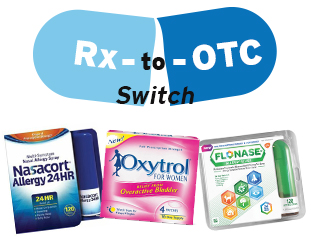Growth of the U.S. nonprescription market is primarily driven by Rx-to-OTC switches as they bring former prescription users to the OTC market. Due to an increasingly favorable regulatory environment, Kline forecasts robust Rx-to-OTC switch activity over the next five years with several all new OTC categories emerging along with many new brands entering the market into existing categories.
If all switches occur over the next five years (even those with low to moderate likelihood), the market is forecast to increase at a compound annual growth rate (CAGR) of 5% by 2019, according to the recently published report covering Rx-to-OTC Switch Pipelines in the United States. By contrast, if the only switches that come to market are those that are predicted to have moderate to high likelihood of approval and launch, the overall OTC market will expand by a CAGR of 3.6% over the next five years.
“Regardless of the number of switches, these new products will expand consumer access to important medications and make them take a more proactive approach to managing their health. They will also serve to drive revenues for industry marketers and retailers,” comments Mahecha.
Despite the switch uptake, the market growth is relatively flat, increasing by 1.4% in 2014 as sales in several product categories, such as weight loss medications or home diagnostic test kits, decline steeply. However, this is offset by product classes such as upper respiratory, digestives, topical products, and feminine products registering higher-than-market average increases, finds the imminent Nonprescription Drugs USA report by Kline.
“In the last year or two, there have been two first-in-class switches in categories that five years ago would have been thought of as challenging,” comments Laura Mahecha, industry manager at Healthcare Practice at Kline. “These are Oxytrol for Women (Merck) in September 2013 for the OTC treatment of overactive bladder and Nasacort 24HR (Sanofi) intranasal steroid for the treatment of allergies in 2014. The FDA Advisory Committee seemed more streamlined in each case, focusing on consumer studies and using prescription usage data on safety and efficacy as sufficient evidence,” adds Mahecha.
Two additional intranasal steroid switches have been approved since, namely Flonase Allergy Relief (GlaxoSmithKline) in July 2014 and Rhinocort Allergy Spray (Johnson & Johnson) in March 2015. Request your Rx-to-OTC Switches Overview, 2005 to 2015 chart.
The OTC drug market’s competitive landscape continues to evolve not only through switches but also through joint ventures and acquisitions. Bayer deepens its company’s strength in many OTC categories with the addition of Merck’s consumer brands. The joint venture of GlaxoSmithKline/Novartis OTC units merges two medium-sized companies to broaden their portfolio of OTC brands.
Kline’s 41st edition of the Nonprescription Drugs USA report offers a comprehensive analysis of the U.S. over-the-counter drugs industry, focusing on key trends, developments, challenges, business opportunities, new product activity, brand sales and shares, retail distribution, regulatory developments, and five-year sales forecasts.
Rx-to-OTC Switch Pipelines USA: Competitive Assessment examines recent and future Rx-to-OTC switches by company in the United States. Each company’s switch pipeline is analyzed on a case-by-case basis, and the forecast time horizon may differ for each.

